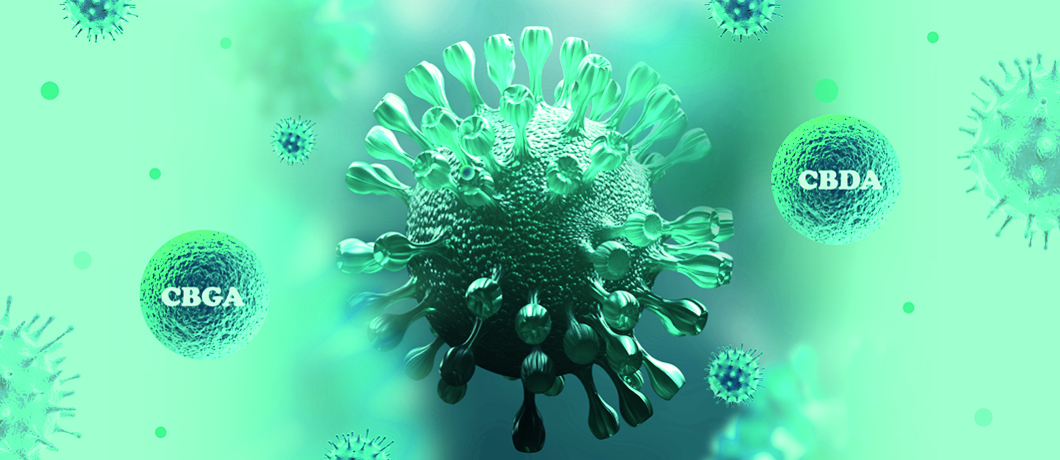Cannabinoids & Covid-19
Last updated:
Published:
The impact of Covid-19

Covid-19 has changed the way we live, with over 270 million confirmed cases since the pandemic began. Whatever your stance on the virus, vaccines, or preventative measures, there's no denying that it's made us rethink how we view infectious diseases. And part of that rethink includes the following:
• Looking at alternative or complementary substances and compounds
• Tackling or preventing emerging variants
Fortunately, researchers affiliated with Oregon State University and Oregon Health & Science University may have found two suitable candidates for the goals above—non-toxic cannabinoids cannabigerolic acid (CBGA) and cannabidiolic acid (CBDA).
Cannabinoids and Covid: What does the research suggest?
Published in the Journal of Natural Products, a new study suggests that a combination of CBGA and CBDA could complement vaccines by preventing "entry of live SARS-CoV-2 into cells".[1] The researchers go on to suggest "these cannabinoids, isolated or in hemp extracts, have the potential to prevent as well as treat infection by SARS-CoV-2".
Before explaining some of the mechanisms involved, it's crucially important we point out that this study was conducted 'in-vitro'—essentially meaning microorganisms and test tubes. The jump from this kind of testing to human or animal clinical trials presents dozens of complications and challenges, but more on those shortly.
The efficacy of CBDA and CBGA
Despite the long road ahead, the latest research does offer plenty to get excited about. The researchers outlined that a critical part of the coronavirus' infection process is binding to enzymes found in the lungs using its spiked protein exterior. As such, their efforts focused on preventing or reducing this ability with the help of raw cannabinoids from hemp, a member of the Cannabis sativa L. family.
A whole host of cannabinoids were tested, from CBD to CBC, THC, and CBN. And, while CBD may block viral entry of SARS-CoV-2, it was the precursor cannabinoids CBDA and CBGA that showed potential effectiveness against multiple variants. By incubating small samples of "live SARS-CoV-2 virus with 25 μg/mL of either CBDA, CBGA, or vehicle control (DMSO)", the researchers observed the infection rate, or lack thereof, in cells.
The study also outlines another significant advantage of raw cannabinoids such as CBDA and CBGA—their oral bioavailability and "long history of safe human use" either isolated or as part of hemp extracts. So, with hemp seemingly able to prevent or treat Covid-19 infections, at least in a laboratory environment, what does that mean for practical, real-world applications?
The future for cannabinoids and emerging Covid variants
The evidence presented by both Oregon Universities certainly paints a compelling picture for using cannabinoids to potentially treat or prevent Covid-19 infections. However, no compound is flawless, and the researchers were quick to acknowledge this, adding:
"resistant variants could still arise amid widespread use of cannabinoids but that the combination of vaccination and CBDA/CBGA treatment should make for a much more challenging environment for SARS-CoV-2."
There's also the momentous jump from in-vitro studies to animal models or human trials. We currently have no idea of what dosage would be needed, the longevity of our newly acquired Covid resistance, how the cannabinoids fair across different demographics, and much more.
Fortunately, the results of this study provide a solid foundation for other institutes to explore the practical applications of cannabinoids. If there's one thing we can say for certain—this evidence reinforces the need to examine all of the active compounds within the Cannabis sativa L family.
If you're interested in learning more about cannabinoids, how they form, and where CBDA and CBGA come from, visit our CBD Encyclopedia for everything you need to know.
[1] 1. van Breemen RB;Muchiri RN;Bates TA;Weinstein JB;Leier HC;Farley S;Tafesse FG; R. Cannabinoids block cellular entry of SARS-COV-2 and the emerging variants. Journal of natural products. https://pubmed.ncbi.nlm.nih.gov/35007072/. Published 2022. Accessed January 13, 2022. [Source]













